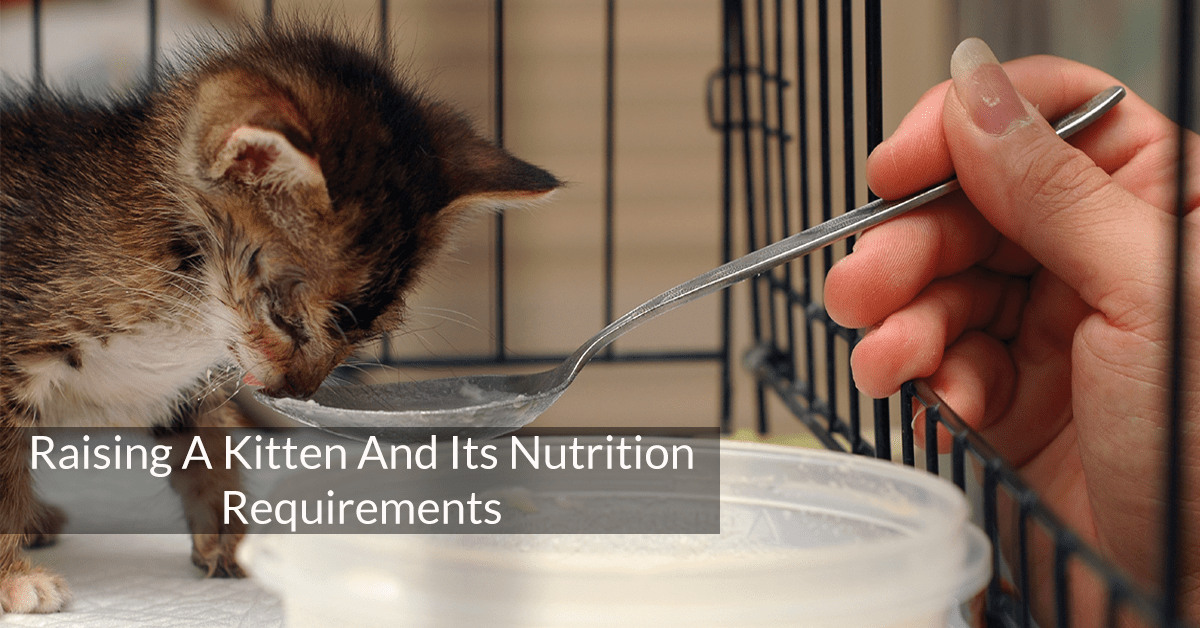When it comes to raising kittens, philosophy is almost similar to raising children. If you provide proper care and training to kittens at a young age, it increases the odds that they will grow up to be healthy, well behaved, loving adults. So, if you recently adopted a kitten, follow these given instructions as much as possible.
1. Don’t treat your young kitten like an adult cat
Just like humans, the kitten’s needs are different from adult or teenage cats. Also, extensive care and management should be given to kittens.
Stages to raise a Kitten:
Stage 1
At a very early age or kitten under eight weeks: At this stage, a kitten should still live with its mother and other litter mates because these young kittens cannot regulate their temperature. They depend on their mother’s body heat to survive. Also, they are still in developmental changes of vision and body coordination. If you adopt or raise an orphaned kitten in this age group, special care will be required, including bottle-feeding the kitten every two hours until the age of four weeks. You also have to help the kitten in urination or defecation in this stage. It is best to consult a veterinary doctor for specific instructions and advice.
Stage 2
From eight to eleven weeks: Kittens are usually weaned at eight weeks. They should be fed with a high-quality kitten diet compromises of high energy and protein components, which are also highly digestible.
Whether you choose dry or wet food, make sure it’s prepared and formulated especially for kittens. During this time, other significant changes will begin to take place. When your kitten begins to develop complex motor skills, it starts running, playing, jumping, and keen to explore new things. This is a fun time for kittens, but it can also be dangerous if your fur baby is not supervised appropriately. Start setting limitations and boundaries for your kitten and keep it in a safe, closed room when you can monitor it.
Stage 3
From two to four months: This is a rapid development stage for kittens in which they will have three times more energy than an adult cat. During this time, they will need three to four high-quality meals a day. According to professional experts, this food should contain at least 30-35 % high-quality protein.
Stage 4
From four to six months: Kittens at this age are near to adolescence and sexual maturity. To avoid irritating and unpleasant habits such as accidental littering and territorial spraying, talk to your veterinarian about spaying or neutering your kittens before reaching puberty.
2. Socialize and reward good behavior
The socialization and training your kitten receives during young age affects how well they will communicate or interact with people and other animals as they grow up. Pet parents who raise kittens for the first time are very anxious. They keep them very safe and secure and do not allow socialization or many essential things to get familiar with. So these kittens may become frightened cats when they grow up.
You must try your best to expose them to the surrounding environment and socialization as much as possible. Walking on leashes, loud noises, strangers, etc., all of this helps them become better adjusted and healthier socialized adult cats. Make sure your kittens have a joyful experience with any social exposure you provide.
As a new kitten parent, it will be your responsibility to guide him and show him that the world is a beautiful place.
Consider trying some of these socialization and training methods:
- Kittens will usually use litter boxes by instinct, but you can help teach them how to use them by putting them in a box after eating and playing sessions. Make sure the cat litter box is always available for your kitten and is cleaned frequently.
- Introducing her to cat toys
- Allow her to walk on different surfaces (linoleum, carpets, etc.).
- Try to pet her more often
- Get your kitten accustom to combing and grooming.
- Take your kitty out into her carrier (It can be very dangerous to allow a kitten to go out without anyone.) However, before any outdoor exposure, make sure your veterinarian has appropriately vaccinated, and your kitten has had passed enough time to build immunity.
- Make noise and play loud music (not frequent)
- Give them new items to explore, such as paper bags and boxes
- Meet friends and ask them to play with her and give her lovely treats
- Provide appropriate alternatives to scratching (such as abrasive cat trees or posts) and reward them with compliments, toys, or treats when they use them.
- Don’t let your kitten bite or scratch during play. If she does, let her focus on any other toy.
- Take your kitten on SUV/Car rides, give her treats all the time, and get her used to her cat carrier.
- Expose it to other cats and kittens (as soon as they get the complete vaccination!). There are even kittens’ socialization schools. Search the Internet to see if anyone is available in your area.
- Teach your kitten to think by teaching her different tricks.
- Repay their good response and behavior with kindness or compliment.
- Do not respond harshly to her bad behavior; instead, ignore her when she displays inappropriate behavior.
- Always be calm and patient while training them
3. Prioritize preventive care
To help ensure that your kitty will be in good health throughout her life, start providing precautionary care to her as soon as possible.
Make an appointment early. No matter what, plan your kitten’s first veterinarian appointment within a week of getting her. Early and frequent doctor visits help your kitten socialize with the doctor and help the doctor establish a key area for your kitten’s health.
Ask about fleas, intestinal parasites, and heartworms. Let your veterinarian check her for intestinal parasites and have your kitten dewormed if necessary. And while heartworms are not as much of a problem for cats as they are for dogs, some kittens can also be sensitive and susceptible to them, so ask your doctor if they recommend heartworm prevention.
The biggest parasitic threat to your kitten is fleas. When your kitten is around 9 to 12 weeks old, you can start using topical flea prevention. Although, some brands provide topical flea prevention formula at four weeks of age. So always consult your vet.
Ask the vet about when and what vaccines your cute kitten needs:
Preventive care for kittens may include rabies, feline leukemia, and distemper. These shots are usually given for the first time when a kitten is about seven-eight weeks old, while boosters are given every few weeks until it reaches 16 weeks of age. After that, your veterinarian can schedule it for adult vaccination schedules. Your vet may also recommend additional vaccines for those diseases which are prevalent in your particular area/state.
These elementary units will give your kitten the best start in life, but don’t forget that your kitten will still need a lot of attention and care as she grows.
Kittens Nutritional Requirements
Cats less than one-year-old are often termed as kittens. They need the best-formulated food with high-quality nutrients necessary for the development and healthy growth during this time.
Some of these nutrients include:
- Far more calories, protein, and fat than adult cat foods to cope with their growing bodies’ needs.
- The omega fatty acid (DHA) is an essential nutrient for vision and brain development in kittens.
- Minerals & vitamins, including vitamin E, and selenium, are beneficial antioxidants that help kittens develop their immune system.
- Kittens also need more calcium and phosphorus for proper bone development.
Things to keep in mind when offering food to kittens
- When it comes to raising a kitten, it is necessary to provide her with nutritious food.
- Give your kitten very high-quality food (home-cooked or good commercial brand).
- Both canned and dry foods are fine as long as the food contains mostly animal protein and not too filler.
- Although dry food is better for keeping kitten teeth clean, it can also make your kitty dehydrated because they have a low thirst drive.
- If you are not sure what to feed your kitten, talk to your vet about her food issues. They will suggest what to feed your cat based on its specific nutritional needs
Effect of age on cat/kitten feeding requirements:
Provide cat food according to age. When your cat is young, you must give her kitten food, which provides more protein and fat for its growing brain and body. As the cat ages, you should feed her food that gives him complete nutrition without giving her so much that she gains weight. As your kitty gets older, you may need to move it to senior/older cat food, which provides all types of nutrition your older cat need.
Tip: Never make sudden food changes for your cat. Slowly move your cat from one food to another. Otherwise, it leads to gastritis, stomach upset and off-feeding
Water requirements for kittens:
- Give unlimited access to drinking water. It is necessary to provide your cat with clean and fresh water at all times, as dehydration can make your cat very sick. Pour the water into a clean bowl and change it daily so that the water will appeal to the cat to drink.
- Try kitten-drinking fountain. The rapid flow of water can attract your cat’s attention and encourage her to drink as much as possible.
- Keep kitten’s water away from litter box and food. Kittens usually see water near these areas as contaminated.
- Kittens can be picky. If your kitten is not drinking water, the water may not be fresh, or the fountain, water cup/bowl, or glass may be dirty.
What type of specific food cat can eat?
We all know cats are obligate carnivores. So, their primary diet must be made up of meat. Cooked beef, chicken, turkey, and small amounts of lean deli meats are a great way to give them that. Raw or spoiled meat could make your cat sick.
Both types of commercial and home-cooked meals should be given to cats. We all know that subcontinent packed food is not yet widespread and affordable, so you must select international commercial cat food brands. Also, most local Indian cat food is not ISO certified or registered with FAO. So, they may cause health issues to your beloved felines. That’s why always go for the best quality cat food products.
Types of Commercial Cat Food
Commercial cat foods are formulated as:
- Dry
- Semi-moist
- canned
These products differ in water content, palatability, caloric density, protein level, and digestibility.
Commercial cat food (dry, canned, semi-moist) ingredients include:
- fish meal
- meat and meat by-products
- milk products
- poultry and poultry by-products
- fiber sources
- grain and grain by-products
- vitamin and mineral supplements
The dry food pieces are often coated with flavor enhancers, such as animal fat, to make the food more delicious. Kittens’ main diet is usually dry milk or KMR.
What kind of home-cooked meal food can be given to kittens then cats?
A home-cooked meal consists of non-fat dry milk, KMR, and a high protein diet that will be preferred to give to kittens compared to cats. Also, make sure the kitten diet is soft and moist compared to adult cats because their GIT tract is not fully developed to digest very hard or dry food.
The given homemade recipe is best for young kittens
Ingredients:
- 1-2 tablespoon non-fat dry milk
- 2 tablespoon eggs
- 2-3 tablespoons of cheese
- 2-3 tablespoons of grated vegetables
Instructions
Mix a small amount of water with the milk powder, then add the eggs and mix well. After that, pour the mixture into a medium-sized non-stick frying pan and cook on medium heat until done. Flip over the amalgam like a pancake and spread the fine cheese and vegetables over half of the cooked surface. Fold similar to an omelet. Cool it and cut it into small pieces to serve.
What kind of milk needs to be given to kittens under eight weeks of age?
Do not give your kitten cow’s milk. It can make them sick, and they may suffer from severe diarrhea. You can obtain a mother’s milk replacer for young kittens below the age of eight weeks. We recommend KMR. When the kittens are eight weeks or older, they no longer require milk. Milk that has been specially processed for cats to consume safely is available from many local groceries.
How can one administer milk to orphaned kittens?
The kittens must be burped during and after each feeding. Hold them over your shoulder or upright and pat their back. Tube or bottle feeding needs to be done very carefully to prevent aspiration of the supplement, which leads to aspiration pneumonia.
Substitute 2-3 tube feedings a day with bottle-feeding to help satisfy the suckling reflex. This should help decrease the kittens’ tendency to suck on each other, possibly causing sores.
Other Methods:
Feed milk via Syringe
You can use a sterile Syringe to feed kittens milk. (Do not push pressure on the plunger while feeding with Syringe; otherwise, it leads to aspirational pneumonia).
Feed milk via spoon
Offer milk via spoon slowly and steadily. They lick it and drink it, eventually
Tip: Never hold your kitten’s tongue while feeding him/her milk or any liquid item.
After how many days, the eyes of a kitten open?
Cat eyes are open for around 8-12 days, and the eyes will slowly begin to open. Never try to open a kitten’s eyes; let them open naturally. All kittens will be born with almost blue eyes, which will change to their adult eye color as they age.
Can a kitten be given 2-3 eggs daily?
No, half an egg for a kitten and one egg for a large cat is enough. Because adult cats need 150-200 calories a day, and one egg can provide 90 calories.
How often should a cat be fed?
Cats can give free access to food . Or three times a day is best
What is KMR? Is it readily available?
KMR is Kitten Milk Replacer. And it is readily available
Instead of cow/buffalo milk, what options can be given to a 3-month-old kitten?
You should not give cow/buffalo milk to all cat breeds. So human mother milk replacer is best for them when they are three months old
Is it a must to feed the cat with non-vegetarian food?
Cats are obligate carnivores, and they must require meat. Veggies can only be given as an optional diet.



